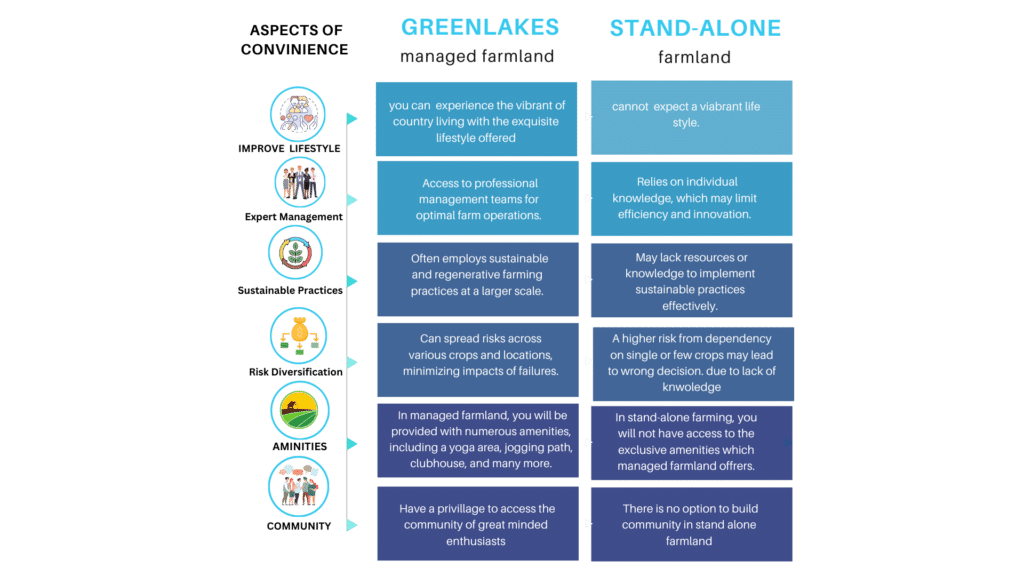As the world evolves more into AI technology, people are increasingly inclined towards sustainable living, which offers peace, profits, and passive income. The benefit of owning managed farmland is becoming a pivotal part of this trend, offering a unique combination of environmental sustainability and financial gain.
Let’s find why it is important to own managed farmland along with the benefits you will reap.
Why go for land investment?
Investing in land combines intangible and tangible benefits with alignment with your personal and financial objectives. Here are key reasons to consider land as an investment:
1. Limited Supply, Unlimited Potential: The finite nature of land, especially in desirable locations, coupled with increasing demand, ensures that land values have a natural tendency to appreciate over time.
2. Potential for Passive Income: Through leasing for agricultural, recreational, or commercial use, land can become a source of passive income, offering returns while you hold onto the asset for long-term appreciation.
3. Legacy Building: Land ownership allows you to create a lasting legacy that can be passed down through generations, providing financial security and a piece of heritage.
4. Your weekend gateway: You can discover your joy and build healthy emotions with managed farmland creating a homely environment for the weekend, provided with dedicated staff for your needs.
5. Hedge Against Inflation: Historically, land values tend to rise with inflation, making it an excellent hedge against the eroding purchasing power of money. As costs of living increase, so does the value of your land.
6. Near the heart of Bangalore: As the city is coming up with new growth opportunities, people are looking for managed farmland outskirts of Bangalore.
The above are some important benefits of owning managed farmland which can only be felt and enjoyed once owned.

Future Trends of Managed Farmland That Grow the Yields
- Sustainable Practices: The benefit of managed farmland using eco-friendly farming includes attracting subsidies and grants, and enhancing financial returns.
- Community-Supported Agriculture (CSA): This model ensures stable demand and income, securing investor returns—a direct benefit of managed farmland.
- Organic Farming: The growing demand for organic produce boosts land value and investor returns, highlighting the environmental benefit of managed farmland.
- Regenerative Agriculture: Increases soil quality and yield quantity, which translates to more profits and a benefit of managed farmland in terms of crop quality.
- Direct Sales Channels: Expanding market reach through online platforms boosts profits, a clear benefit of managed farmland for owners.
Comparison between managed farmland and stand-alone farmland:
The distinct advantages of managed farmland over stand-alone farmland include the following points:

What goes into insurance for managed farmland? Find out and protect your investment today?
Crop Insurance: This covers losses due to natural disasters such as drought, flood, hail, and pests. It can be specific to certain crops and include yield protection, revenue protection, and insurance for prevented planting.
Liability Insurance: Protects against legal liabilities arising from accidents, injuries, or other incidents on the farm. This can include coverage for both workers and visitors.
Property Insurance: Covers damage to farm property and assets, including buildings, equipment, and sometimes even livestock. This insurance can protect against fire, theft, and some natural disasters.
Livestock Insurance: Specifically designed to protect against the loss of valuable animals due to death from disease, accidents, or extreme weather.
Equipment Insurance: Protects against the breakdown or damage of farm machinery and equipment, which can be a significant financial risk given the high cost of agricultural machinery.
Important considerations for choosing managed farmland near Bangalore:
Land and Management:
- Company reputation and reliability: Research the company’s track record, financial stability, and experience managing farmlands.
- Ownership and legal clarity: Ensure the company has clear ownership of the land and verify all legal documents.
- Management practices: Understand the farming methods used (organic, sustainable, etc.), the expertise of the farm managers, and their transparency in communication.
Investment and Returns:
- Investment structure: Understand the investment options (lease, ownership, profit sharing) and associated risks and benefits.
- Financial projections and guarantees: Ask for detailed financial projections, guarantees, and clauses related to unexpected events.
- Tax implications: Consult a financial advisor to understand the tax implications of investing in farmland.
Logistics and Access:
- Location and accessibility: Consider the distance from Bangalore, commute time, road conditions, and access to essential services.
- Infrastructure: Check for amenities like security, internal roads, electricity, and waste disposal.
- Conducting Due Diligence: Before completing an investment it’s crucial to perform due diligence, this includes proper documentation, examining legal titles, and calling farmland experts is also important.
- Community and engagement: Understand the potential for interaction with other investors and involvement in farm activities.
Imagine the satisfaction of nurturing your slice of paradise, knowing it’s an investment in both your health and your wealth. Managed farmland near Bangalore offers more than just returns, it offers a connection to nature, a legacy you can build, and a pathway to a fulfilling future. Contact a farmland expert today and claim your piece of tomorrow!


